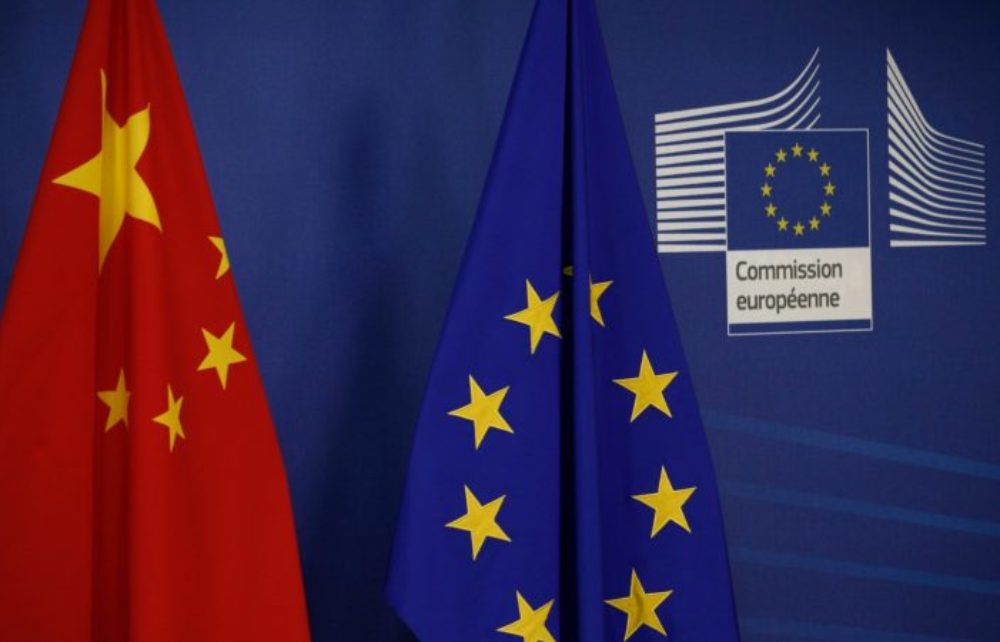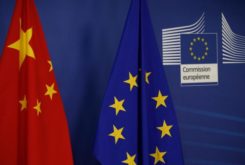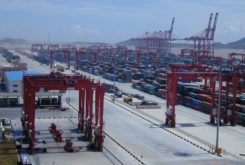The 22nd European Union-China bilateral Summit, on 22 June 2020, was rocked by disagreement between the two powers on human rights issues, namely regarding Hong Kong, and also the european demand of a “level playing field” on trade.
President of the European Council, Charles Michel, and President of the European Commission, Ursula von der Leyen, accompanied by High Representative Josep Borrell, held the Summit meeting with Chinese Prime Minister Li Keqiang followed by exchanges with Chinese President Xi Jinping.
The European Union (EU) statement on the videoconference summit states that on Hong Kong, “the EU reiterated its grave concerns at steps taken by China to impose national security legislation from Beijing and considers those steps not in conformity with the Hong Kong Basic Law and China’s international commitments, and put pressure on the fundamental rights and freedoms of the population protected by the law and the independent justice system”.
The EU also raised its concerns “on the deteriorating human rights situation, including the treatment of minorities in Xinjiang and Tibet, and of human rights defenders, as well as restrictions on fundamental freedoms”. The EU also underlined its expectation that the Human Rights Dialogue will take place in China later in the year once the COVID-19 restrictions are eased.
EU Leaders raised a number of individual cases, including the reports on citizens who have disappeared after reporting/expressing their views on the handling of the Coronavirus outbreak, as well as the continued arbitrary detention of Swedish citizen Gui Minhai and two Canadian citizens – Michael Kovrig and Michael Spavor.
China repudiated the warnings from the European Union, claiming the new Hong Kong national security law is a “domestic affair”. “We oppose any foreign interference in this matter,” said Wang Lutong, director-general of European Affairs at China’s foreign ministry, adding that China had made its position clear in an EU video summit Monday between President Xi Jinping and top EU officials.
Speaking after video calls with Chinese Premier Li Keqiang and President Xi Jinping, the EU’s chief executive and chairman said the new legislation was a matter of ‘grave concern’ and could jeopardise the territory’s semi-autonomous status and role as a global financial hub. European Commission President Ursula von der Leyen said the law did not conform with the Hong Kong Basic Law, in reference to the mini-constitution that was agreed between Britain and China ahead of the 1997 handover.
The comments came after China’s parliament reacted angrily on Saturday to a resolution by the EU assembly protesting against the security law.
According to the EU´s statement, “progress today is limited” on the commitments made at the 2019 EU-China Summit. “The EU strongly emphasised the need to advance negotiations for an ambitious EU-China Comprehensive Investment Agreement that addresses the current asymmetries in market access and ensures a level playing field. Urgent progress is needed in particular on behaviour of State-Owned Enterprises, transparency on subsidies and rules tackling forced transfers of technology”, it adds.
On economic and trade issues, the EU recalled the joint commitment to work constructively and expeditiously towards the resolution of a number of market access and regulatory issues. The EU welcomed confirmation by China that the recent China-US “phase 1” deal will be implemented in full compatibility with World Trade Organisation (WTO) obligations and without discrimination against EU operators. The EU recalled its expectation that European exporters immediately benefit from trade facilitating measures in the agri-food sector.
The EU reiterated the urgent need for China to engage in future negotiations on industrial subsidies in the WTO, and address overcapacity in traditional sectors such as steel as well as high-tech areas.
“The EU is looking forward to the signature of the EU-China Agreement on Geographical Indications in coming weeks and entry into force in nearest future”, the statement adds.
The “EU stressed that the development of new digital technologies must go hand in hand with the respect of fundamental rights and data protection” and “also raised outstanding issues on cybersecurity, disinformation”.
The EU further “called on China to assume greater responsibility in dealing with global challenges through the rules-based international system, promoting international peace and security, and adhering to international standards to support sustainable development, especially in Africa”.
In response to the COVID-19 pandemic, the EU underlined the shared responsibility to participate in global efforts to stop the spread of the virus, boost research on treatments and vaccines, and support a green and inclusive global recovery. The need for “solidarity in addressing the consequences in developing countries, notably as regard debt relief” is another european concern.
The EU also called on China to fully participate in the independent review of lessons learned from the international health response to COVID-19, mandated by the resolution adopted at the last World Health Assembly and to facilitate the return of EU residents in China.
President Charles Michel said “EU-China economic interdependency is high”, and both powers “must work together on global challenges like climate action, meeting the Sustainable Development Goals or dealing with COVID-19”. “But, at the same time, we have to recognise that we do not share the same values, political systems, or approach to multilateralism. We will engage in a clear-eyed and confident way, robustly defending EU interests and standing firm on our values.”
EC President von der Leyen added that for China-EU “relations to develop further, they must become more rules-based and reciprocal, in order to achieve a real level playing-field.”




